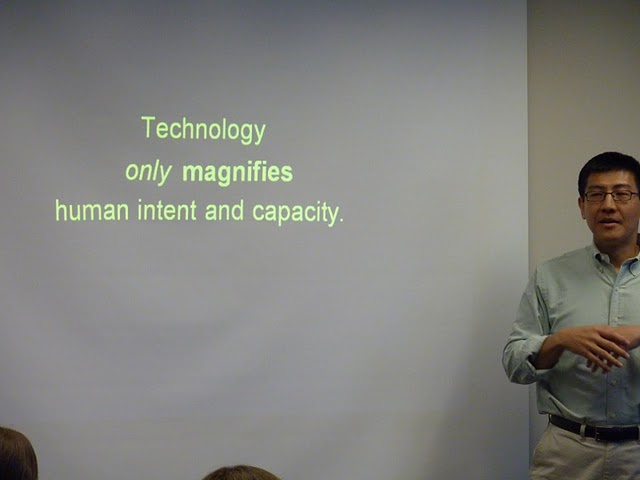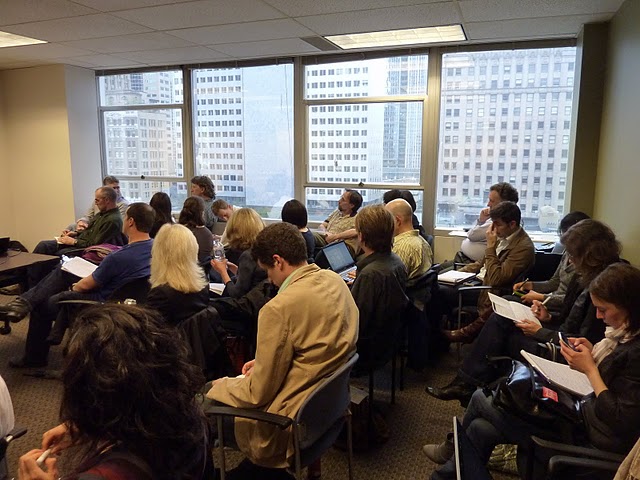Posted on May 12, 2011
On Monday over seventy five people gathered at St. Mark’s Cathedral to hear an expert panel speak about the global implications of India’s micro-credit crisis. Among the panelists were David Roodman, a senior fellow at The Center for Global Development Rick Beckett, president and CEO of Global Partnerships, Chris Wolff, senior director at accion international and Peter Bladin, executive vice president at the Grameen Foundation. Prior to the event, Global Washington members working in micro-finance gathered for a private round table discussion to examine what their organizations could learn from this crisis.
The event kicked off with a fifteen-minute crash coursegiven by David about what had happened to cause the micro-finance crisis in the India. He explained, that the region of Andhra Pradesh had been experiencing a very high rate of growth in micro-finance for the past twenty years or so. Among micro-finance providers was Sks, a large MFI that went public at the end of last summer. The organization was founded by Vikram Akula, whom was previously valued at an astounding 90 million dollars. These big numbers hit the papers and showed how much money was being made off of the backs of the poor, which created some negative back lash towards micro-finance.
Roodman said: “there were many causes from global warming to political parties but I do think the main problem was fast growth, credit just became too easy.” He went onto say: “should we blame profiteering for what happened in India? My answer is no” In addition to high growth, Roodman seemed to think investors needed to take more accountability for the bubbles that were being created by this oversees capital.
Roodman explained three main notions that surround micro-finance. Firstly, he expressed the idea of micro-finance as helping people escape poverty. When describing this notion he boldly stated “we don’t have evidence it reduces poverty.” The second notion he described was micro-finance as freedom. Here, Roodman brought up several fantastic examples from the book: Portfolios of the Poor which he used to make the point that “poor people don’t have perfect financial services,” such as health insurance. Therefore micro-finance can be one more tool that helps the poor in the times that they are not able to cover their expenses. The final point he made was the idea of micro-finance as industry building. Here he gave the famous example of the Grameen Bank, which has created thousands of jobs and improved the industry in Bangladesh. From this overview, the discussion was then opened up to the panel of people that represented micro-finance practitioners to see what their interpretation of Roodman’s thoughts were.
Beckett embellished on Roodman’s point about the bubble saying: “it is not only the amount of capital, it is the nature of the capital” that we need to pay attention to when looking at investments in micro-finance. While Wolff highlighted that we need to use this event in India as a learning experience, he said we must all ask the question:” How can we use this situation to be better, to be more client focused?” Bladin hinted that profit may have played a role in the problems in India when he said: “you’ve got to have the double bottom line and measure how you are reaching the people there.” Ultimately, while most panellists seemed to agree with Roodman’s points, there was a lot of discussion about how to further expand these lessons all the way from India to the MFIs operating in Seattle.
One of the few points of contention seemed to be whether micro-finance had truly made an impact or not. While Beckett acknowledged that micro-finance may not be perfect, he said: “One of the great challenges in global development is there are very few ways of reaching 100’s of thousands of people. Micro-finance does this so it has the ability to serve as a sustainable channel for other things…. There just aren’t that many things that do that.” Others brought up the point that while there was no evidence that micro-finance was actually pulling people out of poverty; there was also not evidence to the contrary. Overall there seemed to be a consensus that regardless of the result of these studies, micro-finance had succeeded in making poverty more liveable, so this form of development is at least providing a short-term solution. “There is a piece of this that is important for us to own, that MF got romanticised…and we fell in love with it” said Beckett. Everyone seemed to agree that recent events in India were an opportunity to see some grounding realities in the world of micro-finance, but not to fall out of love with the field entirely.
To read more about the event please visit the KPLU Humanosphere recent posting.
Posted on May 11, 2011
“Kids in the developing world need the newest technology…”[1]
“Can the cellphone help end global poverty?”[2]
 Amidst such buzz around technology’s role in global poverty and human rights, Kentaro Toyama provided a poignant presentation on the myths of technology in international development to Global Washington members on Friday, May 6, 2011. Following the presentation was a lively discussion between Toyama and the audience, comprised primarily of Global Washington members with theoretical and field expertise in this area.
Amidst such buzz around technology’s role in global poverty and human rights, Kentaro Toyama provided a poignant presentation on the myths of technology in international development to Global Washington members on Friday, May 6, 2011. Following the presentation was a lively discussion between Toyama and the audience, comprised primarily of Global Washington members with theoretical and field expertise in this area.
A visiting scholar at UC Berkeley and former co-founder of Microsoft Research India, where he designed electronic technology for international development, Toyama intimately understands technology’s role in supporting poverty alleviation work. Throughout the presentation, he stressed that “technology magnifies intent and capacity” and cautions against looking to technology, in and of itself, as a solution to global poverty.
Toyama’s presentation focused on countering seven myths regarding technology in international development.
Myth #1: Technology undoes the rich getting richer.
Toyama began with a question to the audience that went something like, “you and a poor Ugandan rural farmer are each given an e-mail account and asked to raise as much money for the charity of your choice. Who would be able to raise more money?” The room indicated that they would be able to raise more funds due to various reasons, from the relative affluence of their friends to their computer literacy skills to their education in articulating written concepts. And thus began Toyama’s presentation, highlighting that even with identical technology, other capacities and systems have to be addressed to gain equality.
Myth #2: Hardware and software are a one-time cost
Toyama reminded Global Washington members that the average American mid-size corporation spends approximately $7,000 per year on their IT budget. Thus, hardware and software are NOT a one-time cost. In contrast, there is a need to continue to invest in technology.
Myth #3: Needs translate to business models
Using the fact that Google does not make a profit from YouTube and Google Maps – services that we might consider quite useful in our lives – Toyama illustrated that people don’t always pay for needs.
Myth #4: Automated is cheaper and better
Toyama highlights problems with full automation, particularly in the developing world: cost, literacy, lack of technological familiarity and errors within technology.
Myth #5: Information is the bottleneck
In the developed world, and even more so in the developing world, time, effort, basic needs and a host of other priorities get in the way of obtaining all of the information that’s available. For example, just because a person has access to the Internet, and thus educational resources, does not mean that person can and will obtain a full education.
Myth #6: Technology’s impact is only positive
Because “technology magnifies positive and negative intent,” technology may have positive as well as negative effects. For example, technology can easily further the negative effects of gender inequality, abuse and child prostitution.
Myth #7: Technology X will save the world
Contrary to popular belief at the time of their invention, radio, TV, landline telephones and PCs have yet to save the world. In fact, in places where we would most desire to see technology make positive change, we don’t see this change because other key systems are missing: physical, social, financial and digital infrastructure.
So, how do we use technology successfully in global development work?
Toyama offered recommendations for successful use of technology, which include:
- Apply technology to existing social trends or institutions, which are already making an impact.
- Focus on nurturing human “intent and capacity.”
- The human component to any technology is critical.
 Global Washington members dug deeper asking about and commenting on their work in community readiness for technology, successes and failures in technology, public-private partnership models and the role of education.
Global Washington members dug deeper asking about and commenting on their work in community readiness for technology, successes and failures in technology, public-private partnership models and the role of education.
Global Washington’s mission is to convene, advocate, and strengthen the international development sector in Washington State, with an emphasis on the sectors of Global Health, Global Education, Environmental Sustainability, and Poverty Alleviation. In this role, Global Washington brings together its members and the community to discuss critical global topics. Consider two upcoming events focused on technology and global development: Mobiles in Development on June 16 and the Dark Side of ICCT on July 14.
by Bridgette Greenhaw
[1] Negoponte, N. (2005). About the Project: Frequently Asked Questions. Retrieved May 9, 2011, from One Laptop Per Child: http://one.laptop.org/about/faq
[2] Corbett, S. (2008, April 13). Can the Cellphone Help End Global Poverty? . The New York Times.
Posted on May 5, 2011
What do the Zambian economy and a volcano eruption in the Democratic Republic of Congo have in common?
 Apparently nothing. However at Global Washington there is a regular combination of cultures and information sharing taking place where people, creativity, and cross-cutting ideas can come together and make the most unlikely connections. On Thursday, April, 28, 2011, Global Washington hosted Mr. Alfred Chioza is the Deputy Ambassador of Zambia in Washington D.C and Maisha Soul, a musical group from the Democratic Republic of Congo.
Apparently nothing. However at Global Washington there is a regular combination of cultures and information sharing taking place where people, creativity, and cross-cutting ideas can come together and make the most unlikely connections. On Thursday, April, 28, 2011, Global Washington hosted Mr. Alfred Chioza is the Deputy Ambassador of Zambia in Washington D.C and Maisha Soul, a musical group from the Democratic Republic of Congo.
The Zambian government’s efforts and results in creating attractive economic investments frameworks, as well as the country’s successes in economic development were mentioned by the speaker. The audience was invited to invest in agriculture, water resources, raw materials extractions, mining, tourism, health and education. Many participants at the event mentioned that they visited Zambia before and were already working in these areas or are planning to in the future.
 Maisha Soul is a band from the Democratic Republic of whose name means “soul of life”. They sang a number of songs in a mix of Swahili, English, and French. The message of the music written and performed by the four young brothers is a call for peace, promotion of brotherhood, equality, human rights, and freedom. The group was formed in 2002 after the volcanic eruption in Goma, when many people from Congo, including the performers, were in refugee camps. By that time they became a voice of hope in the middle of despair their country has struggled with for decades. The group was sponsored by HEALAfrica, a member organization of Global Washington.
Maisha Soul is a band from the Democratic Republic of whose name means “soul of life”. They sang a number of songs in a mix of Swahili, English, and French. The message of the music written and performed by the four young brothers is a call for peace, promotion of brotherhood, equality, human rights, and freedom. The group was formed in 2002 after the volcanic eruption in Goma, when many people from Congo, including the performers, were in refugee camps. By that time they became a voice of hope in the middle of despair their country has struggled with for decades. The group was sponsored by HEALAfrica, a member organization of Global Washington.
Global Washington’s mission to convene, advocate, and strengthen the international development sector here in the state, with an emphasis on the sectors of Global Health, Global Education, Environmental Sustainability, and Poverty Alleviation. As numerous international visitors come to Seattle to meet with businesses, policy makers, and educational institutions, Global Washington supports its members in organizing events like this to make the visitors accessible to the community of NGO’s, foundations, and individuals dedicated to all aspects of global development.
Liuba Ceban
Liuba.ceban@gmail.com
 Amidst such buzz around technology’s role in global poverty and human rights, Kentaro Toyama provided a poignant presentation on the myths of technology in international development to Global Washington members on Friday, May 6, 2011. Following the presentation was a lively discussion between Toyama and the audience, comprised primarily of Global Washington members with theoretical and field expertise in this area.
Amidst such buzz around technology’s role in global poverty and human rights, Kentaro Toyama provided a poignant presentation on the myths of technology in international development to Global Washington members on Friday, May 6, 2011. Following the presentation was a lively discussion between Toyama and the audience, comprised primarily of Global Washington members with theoretical and field expertise in this area.
 Global Washington members dug deeper asking about and commenting on their work in community readiness for technology, successes and failures in technology, public-private partnership models and the role of education.
Global Washington members dug deeper asking about and commenting on their work in community readiness for technology, successes and failures in technology, public-private partnership models and the role of education. Apparently nothing. However at Global Washington there is a regular combination of cultures and information sharing taking place where people, creativity, and cross-cutting ideas can come together and make the most unlikely connections. On Thursday, April, 28, 2011, Global Washington hosted Mr. Alfred Chioza is the Deputy Ambassador of Zambia in Washington D.C and Maisha Soul, a musical group from the Democratic Republic of Congo.
Apparently nothing. However at Global Washington there is a regular combination of cultures and information sharing taking place where people, creativity, and cross-cutting ideas can come together and make the most unlikely connections. On Thursday, April, 28, 2011, Global Washington hosted Mr. Alfred Chioza is the Deputy Ambassador of Zambia in Washington D.C and Maisha Soul, a musical group from the Democratic Republic of Congo.